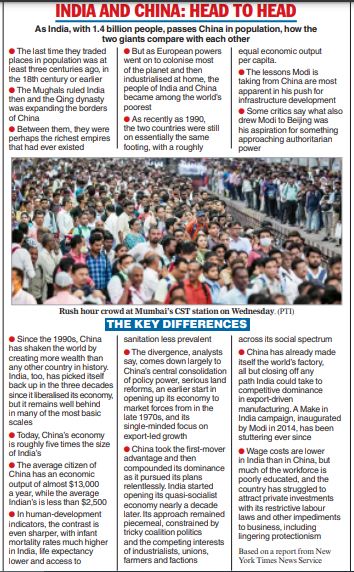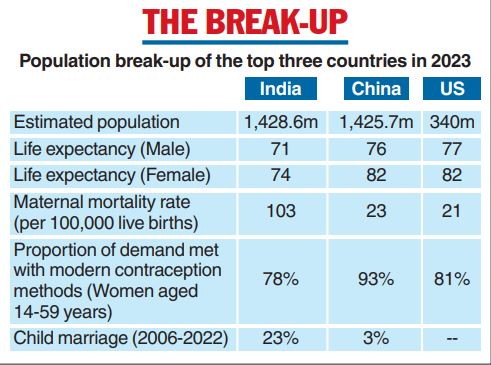India has become the most populous nation in the world, surpassing China with nearly three million more people, according to data from a UN agency that released its latest population report on Wednesday.
The UN Population Fund has estimated India’s population to be 1,428.6 million against China’s 1,425.7 million.
The agency had predicted last year that India would overtake China by mid-2023. The US is a distant third with 340 million people.
Health experts say India’s new position comes amid lingering concerns about an unmet need for contraception and the persistence of child marriage.
A 2019-21 nationwide health survey had found 9.4 per cent unmet need for contraception, implying that even when couples want to adopt a contraceptive method, it is not available to them.
India is among eight countries that will account for half the projected growth in the global population by 2050, the UN agency said in the State of World Population2023 report released on Wednesday.
The others are Congo, Egypt, Ethiopia, Nigeria, Pakistan, the Philippines and Tanzania.
But population trends everywhere point to a slower growth and ageing societies, the report said.

Two-thirds of people now live in a country where lifetime fertility corresponds with zero population growth. Europe is the world’s only region expected to experience an overall population decrease in the near future — 2022 to 2050.
The report, however, said new data suggested that population anxieties were widespread and governments were increasingly adopting policies aimed at raising, lowering, or maintaining fertility rates, cautioning that efforts to influence fertility rates were often ineffective and eroded women’s rights.
“Women’s bodies should not be held captive to population targets,” UN Population Fund executive director Natalia Kanem said in a statement. “To build thriving and inclusive societies, regardless of population size, we must radically rethink how we talk about and plan for population change.”
The report said 44 per cent of partnered women and girls in 68 countries from where data was available do not have the right to make informed choices about their bodies when it comes to having sex, using contraception and seeking health care.
An estimated 257 million women worldwide have an unmet need for safe, reliable contraception.
A public survey commissioned by the UN Population Fund in eight countries — India, Brazil, Egypt, France, Hungary, Japan, Nigeria, and the US — has found that population anxieties have seeped into large proportions of the general public in India.
“Yet, population numbers should not trigger anxiety or create alarm. Instead, they should be seen as a symbol of progress, development and aspirations if individual rights and choices are upheld,” UN Population Fund India representative Andrea Wojnar said in a statement.
The India survey through a sample of 1,007 adults found that 63 per cent identified economic issues as top concerns when thinking about population change, followed by environmental concerns (46 per cent) and sexual and reproductive health rights and human rights (30 per cent).
Some projections have estimated that India’s population will rise to about 1.7 billion by 2060 and decline to 1.5 billion by 2100. A nationwide health survey in 2019-21 had shown that the total fertility rate — the number of children a woman will have — has declined to 2.0 from 2.2 five years earlier.
“Despite the progress on many fronts, patriarchy is deep-rooted in the country — and this gets reflected in the reproductive health programmes,” said Poonam Muttreja, executive director of the Population Foundation of India, a non-government agency involved in population and health issues.
Muttreja said almost the entire responsibility for family planning was on women. “We need to move towards greater involvement of men in family planning. It is also important for more girls and women to get better educated, join the workforce, delay marriage, postpone pregnancies,” she said.
The 2019-21 health survey had detected a 16.3 per cent rate of child marriage (below 18 years).



